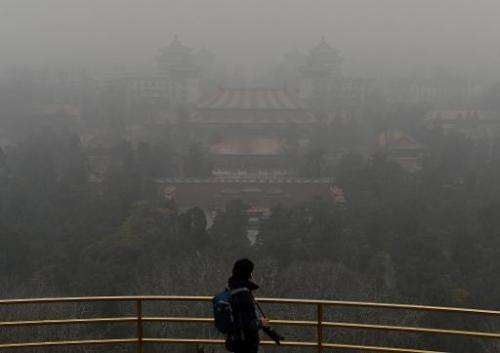A tourist stands at the top of Jingshan Hill beside the Forbidden City as heavy air pollution continues to shroud Beijing on February 26, 2014
China's Supreme Court has set up a special tribunal to deal with environmental cases, it said Thursday as Beijing pushes a green agenda with public discontent over pollution rising.
Three decades of rapid and unfettered industrial expansion have taken a heavy toll on the county's environment, and Communist leaders have been concerned by an increasing number of angry protests over the issue.
Recent studies have shown that roughly two-thirds of China's soil is estimated to be polluted, and that 60 percent of underground water is too contaminated to drink. Meanwhile residents of cities such as Beijing and Shanghai are regularly confronted with hazardous smog levels.
Premier Li Keqiang announced in March that Beijing was "declaring war" against pollution, and a series of measures have been announced, but questions remain over enforcement.
The tribunal—which will have local equivalents—will hear cases involving air, water and land pollution and the protection of mineral and natural resources such as forests and rivers, Sun Jungong, spokesman of the Supreme People's Court, said at a briefing.
Its establishment "will have positive and profound impact on... protecting the people's environment rights and interests... preventing further deterioration of the environment and improving China's international image concerning environment protection," he told reporters.
The move followed an April amendment to China's environmental protection law—the first in 25 years—imposing tougher penalties and pledging that violators will be "named and shamed".
But holding polluters legally accountable has proved difficult in a country where local governments are often focused on driving growth.
"There are indeed some problems in the acceptance, trial and enforcing of (environment) cases," Zheng Xuelin, chief of the environment tribunal of the Supreme Court, told reporters.
"Courts want to hear some cases but dare not to or become reluctant to do so due to certain interferences," he said.
Fewer than 30,000 environment cases a year were accepted by Chinese courts from 2011 to 2013, said Zheng, out of an average 11 million total cases annually.
© 2014 AFP























